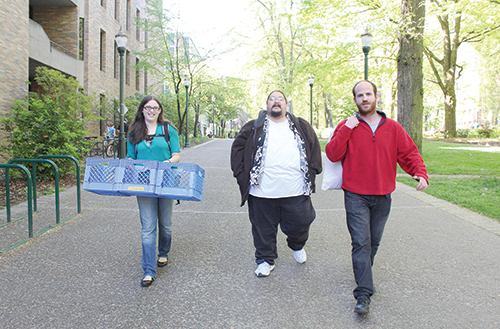
Portland State has long had a reputation as an institution that caters to nontraditional students. Established in 1946 as Portland State College with the mission of serving returning World War II veterans, PSU continues to be a popular choice for students beyond the traditional 18- to 25-year-old college demographic.
In 2012, 54.1 percent of all PSU students were age 25 or older, with almost twice as many undergraduates as graduates. Even so, the statistics reveal that the percentage of nontraditional-aged students has gradually declined over the last 15 years, and the numbers of traditional-aged students has steadily risen.
Bryan Jacobs, a nontraditional-aged senior majoring in international studies, has noticed the diversity on campus.
“I’ve had many classes where I was the oldest person in the class, but right now I’m taking a few where there are several students older than me,” Jacobs said.
Director of Advising and Career Services Mary Ann Barham helped launch a mentoring program for returning women students that eventually grew into the Women’s Resource Center.
“My experience with working with the nontraditional student population is that the return to school is often triggered by some significant life event,” Barham said.
Divorce, job loss, career change, widowhood or returning to school after time off for parenting responsibilities or military service are all common reasons students pursue a degree at a nontraditional age.
“Often the motivation is to pursue a different career path, but there are also people who say, ‘I just want my degree,’ and there are people who want a better job in their field,” Barham said.
Advising and Career Services assists students with choosing degrees, creating resumes and finding jobs, but also helps them access internships, work-study positions and other work experiences relevant to their long-term career goals.
It is one of several resources on campus that is aimed wholly or in part at supporting nontraditional students.
Lisa Wittorff is the coordinator of the Resource Center for Students with Children. “We try to gear our programs to children of all ages under the age of 18,” Wittorff said. Most student parents fall into the 18- to 25-year-old range, but not all. “Sometimes we have grandparents raising grandchildren,” she said.
The center awards scholarships for child care to both on- and off-campus students, operates a Family Resource Room for student parents and has won approval to start providing drop-in child care on campus.
PSU boasts the largest student veteran population in the Oregon University System, and the Student Veterans Association, better known as the Viking Vets, offers support for those attending Portland State following military service. The group’s website states, “The SVA has been involved in a number of projects since its inception. The first, and maybe most important, is connecting veterans to each other and the community at PSU.” In addition, the association assists student veterans in accessing benefits and resources and advocates on policy issues affecting veterans and their families.
Kathi Ketcheson, the director of Institutional Research and Planning, said there’s been a tradition of students, both graduate and undergraduate, returning to PSU after an absence.
“It’s really a part of the culture here at PSU and is reflected in our scheduling, practices, degree programs and campus resources. It’s part of our past and our continuing culture.”

